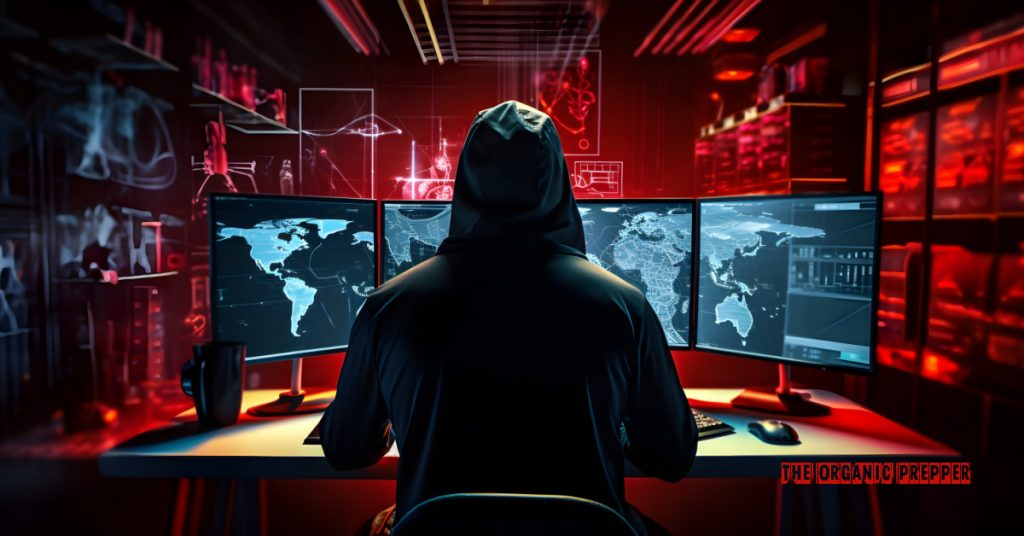by Daisy Luther, The Organic Prepper:

Talk of a “Cyber 9/11” has been circulating for years. With the next presidential election twelve months away now, some folks are predicting that a major cyber event will happen before then, throwing a monkey wrench into the 2024 election process.
What the heck is Cyber 9/11?
What does Cyber 9/11 mean? Is there a real risk? What should we be preparing for?
TRUTH LIVES on at https://sgtreport.tv/
There are two aspects to the Cyber 9/11 concept. The first is the disaster itself; 9/11 was a catastrophe that ended the lives of over 3000 people in one day. There are fears that if power grids were hacked or enough damage was done to logistical centers, the ensuing chaos would cause deaths.
Quite memorably, back in 2000, a disgruntled public works employee in Australia hacked into the water treatment system and caused raw sewage to pour into public areas, flooding a Hyatt hotel. One man acting alone caused a disgusting, expensive mess. Of course security experts are concerned with what a team of angry individuals could do.
The second aspect to a potential Cyber 9/11 is the change in the regulatory landscape that occurred after 9/11 in 2001. I remember flying as a teenager in the 90s. So many things changed later. The airport changes were most obvious to regular citizens, but the passage of the Patriot Act in October 2001 was far more consequential. It dramatically changed the way surveillance was conducted.
Under the Fourth Amendment, private citizens are supposed to be protected from warrantless search and seizures. The Patriot Act really weakened that. Law enforcement is now allowed to delay the notice of search warrants. They don’t need nearly as much oversight from judges to conduct phone and internet surveillance.
These Constitution-weakening changes occurred after 9/11 in 2001.
How might our Constitutional rights be altered after a Cyber 9/11?
Centralized powers have made it obvious that they love using calamities to push through changes the public would never otherwise accept. Winston Churchill was the first person on record to say, “Never let a crisis go to waste,” as he worked to establish the UN in the 1940s, but he was hardly the last.
- Rahm Emmanuel, regarding the 2008 banking crisis: “You never want a serious crisis to go to waste. And what I mean by that is an opportunity to do things that you think you could not do before.”
- Hillary Clinton, regarding the push for universal healthcare in 2020: “This would be a terrible crisis to waste.”
- Klaus Schwab, regarding the Covid pandemic: “. . . the pandemic represents a rare but narrow window of opportunity to reflect, reimagine, and reset our world to create a healthier, more equitable, and more prosperous future.”
Understanding this tendency to see crisis as opportunity is absolutely vital to understanding everything else going on today.
So, is a Cyber 9/11 something we should be preparing for?
Some experts believe that a Cyber 9/11 would be difficult to pull off by the known terrorist groups for technical reasons. And the world is too connected, globally, for most governments to pursue large-scale cyberattacks, even between unfriendly nations. For people who want to use the internet to harm American society, there are simply better ways to do it.
However, we can’t ignore the fact that cyberattacks have been increasing. Ask any small business owner. Daisy has mentioned in previous articles that most of this site’s income goes to security. And I’ve heard similar things from friends that work in fields as diverse as accounting and energy.
These stories from friends align with what security professionals have found, too. The Information Security Forum is a London-based firm that provides guidance on internet security for many Fortune 500 companies and governments around the world. They have seen a huge increase in cyberattacks, too, and in June this year, they hosted an Operational Technology Cyber Simulation exercise in Brussels. This gave industry leaders an opportunity to meet and collaborate, working through a simulation of a cyberattack on a fictitious manufacturing facility
How would governments react to a major cyberattack?
I don’t think a major cyberattack is an unreasonable concern. I also don’t think it’s unreasonable to ask, if we did have a major cyber event, how would our governments react?
Central banks and governments around the world have been talking an awful lot about implementing CBDCs. In late June, 130 countries representing 98% of the global economy were exploring CBDCs. This is despite a lack of interest by average citizens. During Covid, many people became aware of how China used its social credit system, interconnected with online banking, to enforce compliance.
It’s not just China that people can look to with alarm. When Nigeria’s government tried to impose CBDCs on their citizens, widespread protests erupted.
In the U.S., Republican Senators introduced legislation that would ban the federal government from implementing a CBDC. Europeans don’t want CBDCs, either. It has simply become too obvious that CBDCs will be used as a means of control, and politicians have been caught admitting it.
Look at the Rumble pranksters who convinced European Central Bank President Christine LaGarde that she was on the phone with Ukrainian President Vlodymyr Zelensky. She admits, thinking that she is speaking privately, that CBDCs would be used to control what kind of payments the population would be able to make.
Read More @ TheOrganicPrepper.ca



